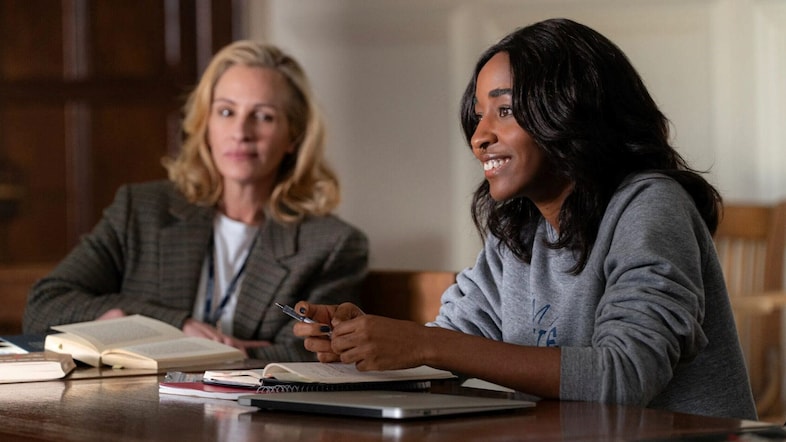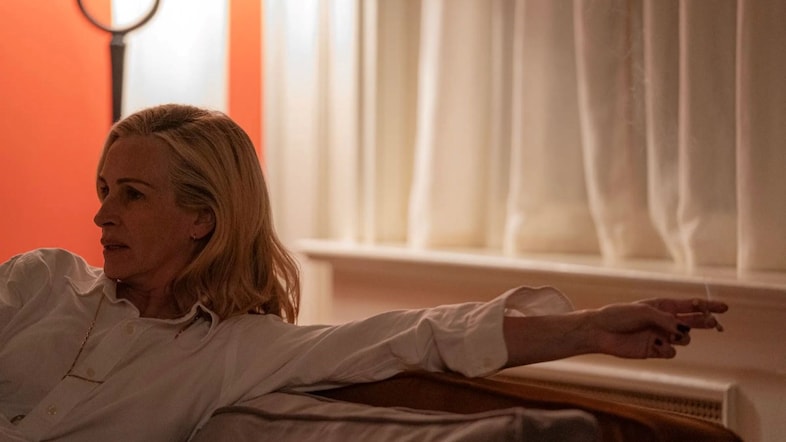Julia Roberts’ turn as a conflicted Yale professor stands out in Luca Guadagnino’s button-pushing new opus, which premiered at Venice Film Festival
Attending Yale University, at least how it manifests in Luca Guadagnino’s After the Hunt, seems akin to living in hell. Maybe not the fire and brimstone kind – there are still lush campus apartments with clean fitted kitchens – but the poisoned, oxygen-starved atmosphere and murky, tinted colours make it unmistakable. The hallowed academic institution hasn’t gone stale, exactly; it’s more like it’s diseased. There’s a bizarre tension between the prissy, tense rooms where smug professors commingle and the way these spaces and people appear on screen. Cinematographer Malik Hassan Sayeed (Clockers, Belly) shoots everything as slightly murky and off-colour, and even if the lines on faces and the glints in eyes are sharp, something lingers behind their expressions that feels purposefully withholding. There are scenes in After the Hunt that play out like memories, as if they were restaged and animated in an anxious dream.
In this hellish, and distinctly Tàr-inflected vision of Yale, experienced (but not yet tenured) academics like Alma (Julia Roberts) and Hank (Andrew Garfield) nurse its toxicity for their own benefit. Written by Nora Garrett in her first produced screenplay, After the Hunt breaks upon the self-serving and contradictory hierarchy of these intellectual spaces with a serious violation – PhD candidate Maggie (Ayo Edebiri) accuses Hank of sexual assault (the word ‘rape’ is uttered only once in the film) after one of Alma’s parties. Hank goes into charismatic, dismissive damage control, and Alma feels pressured between supporting her student’s credible accusation and not yielding on her core ethos of only sticking her neck out for herself and her closest interests. In the upper echelons of Yale’s philosophy department, junior colleagues asking for, or worse, expecting change, is a symptom of naive entitlement. To them, progress is only meaningful if it’s individual and ability-based.
After the Hunt often feels like a bizarre continuation of Guadagnino’s catty explorations of intergenerational tension and deception; insightful commentary on ‘cancel culture’ and Gen Z entitlement is in short supply, and the script often breezes past important expositional details as the scandal spreads from Maggie’s private confessional with Alma to a campus-wide (and then national) magnifying glass on Ivy-league accountability. In an ensemble that also includes Michael Stuhlbarg and Chloë Sevigny, only Roberts as Alma seems to hold Guadagnino’s full attention; both Maggie and Hank disappear from the film for stretches at a time, never feeling as substantial presences as the fatigued, resentful professor.

As a result, Roberts gives the only remarkable performance in After the Hunt, both withheld and venomous, and so resentful of being dragged into the firing line that she torpedoes her own life with remarkable effectiveness. Alma’s Gen X feminist perspective – enduring decades of institutional misogyny means that younger generations shouldn’t be just handed the respect that she had to prove she was worthy of – is charged with ambiguous but swirling health problems and a corrosive buried secret that Maggie, who is lightly obsessed with her supervisor before she is rudely awakened to her real priorities, wastes no time digging into.
As the smarmy and charismatic but lecherous Hank, Garfield weaponises the charm of his public persona, but in crucial scenes overplays Hank’s unpleasantness and overeggs Garrett’s observations of how entitled, grubby men construct their own sympathetic narratives at the drop of a hat. Edebiri is in need of a hefty dramatic role but Maggie is not the one; the character’s voice is pushed too far to the sidelines, increasingly showing up to be a carefully designed obstacle to whatever will impact Alma most destructively.

As After the Hunt pushes on, a gap becomes clear between the unappealing cancellation drama (expect extended talks and/or tantrums about ‘trigger warnings’, ‘privilege’ and so on) and what’s actually compelling – a strange, empty and uncomfortable mood as put-together characters peel off their layers of protective performance, aided by a shifting score by Trent Reznor and Atticus Ross. When Alma and Hank reconnect in the final act, there’s a languid, washed-up ghoulish quality to them, with Guadagnino bringing some of the surreal, dissociative energy of Queer to dialogue scenes that feel more suited to the stage. These formal choices easily overwhelm Garrett’s writing.
Thankfully, Alma’s arc closes with a confessional monologue that’s as dramatically satisfying as it is uncomfortable and open-ended, but the film’s depiction of a modern, button-pushing college clash can’t quite be heard over a creeping sense of strangeness and decay. This latter quality feels more striking as a metaphor on modern discourse – no matter how clear and sophisticated our argument feels, we can’t escape the feeling we’re all sinking into a swamp.
